Fleurs du Mal Magazine


Or see the index
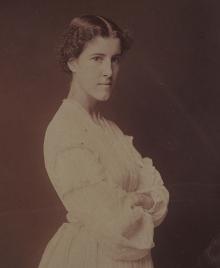
Females
The female fox she is a fox;
The female whale a whale;
The female eagle holds her place
As representative of race
As truly as the male.
The mother hen doth scratch for her chicks,
And scratch for herself beside;
The mother cow doth nurse her calf,
Yet fares as well as her other half
In the pasture free and wide.
The female bird doth soar in air;
The female fish doth swim;
The fleet-foot mare upon the course
Doth hold her own with the flying horse–
Yea and she beateth him!
One female in the world we find
Telling a different tale.
It is the female of our race,
Who holds a parasitic place
Dependent on the male.
Not so, saith she, ye slander me!
No parasite am I.
I earn my living as a wife;
My children take my very life;
Why should I share in human strife,
To plant and build and buy?
The human race holds highest place
In all the world so wide,
Yet these inferior females wive,
And raise their little ones alive,
And feed themselves beside.
The race is higher than the sex,
Though sex be fair and good;
A Human Creature is your state,
And to be human is more great
Than even womanhood!
The female fox she is a fox;
The female whale a whale;
The female eagle holds her place
As representative of race
As truly as the male.
Charlotte Perkins Gilman
(1860-1935)
Females
Suffrage Songs and Verses
• fleursdumal.nl magazine
More in: # Classic Poetry Archive, Archive G-H, Archive G-H, Feminism
Soms humoristisch, soms zakelijk, maar altijd in een volstrekt eigen vorm. De poëzie van Alfred Schaffer wordt alom geroemd om haar meerstemmigheid en schakelt moeiteloos tussen engagement en absurditeit.
 Schaffer ontving de P.C. Hooft-prijs 2021 en is daarmee een van de jongste laureaten ooit van Nederlands belangrijkste literaire oeuvreprijs. Sinds zijn debuutbundel Zijn opkomst in de voorstad (2000), die werd bekroond met de eerste Jo Peters Poëzieprijs, weet Schaffer zich constant te vernieuwen, met het vol lof onthaalde wie was ik. strafregels (2020) als meest recente uiting van zijn virtuoze dichterschap.
Schaffer ontving de P.C. Hooft-prijs 2021 en is daarmee een van de jongste laureaten ooit van Nederlands belangrijkste literaire oeuvreprijs. Sinds zijn debuutbundel Zijn opkomst in de voorstad (2000), die werd bekroond met de eerste Jo Peters Poëzieprijs, weet Schaffer zich constant te vernieuwen, met het vol lof onthaalde wie was ik. strafregels (2020) als meest recente uiting van zijn virtuoze dichterschap.
Zo heb ik u lief. alle gedichten tot nu toe brengt twintig jaar dichterschap en negen bundels samen in één band en laat zien dat Schaffer ontegenzeggelijk een van de beste hedendaagse dichters in het Nederlandse taalgebied is.
Alfred Schaffer (1973) is dichter, docent en vertaler. Hij studeerde Nederlandse Taal- en Letterkunde en Film- en Theaterwetenschappen alvorens in 1996 naar Zuid-Afrika te verhuizen, waar hij als docent verbonden was aan de Universiteit van Kaapstad. Tussen 2007 en 2010 was hij fondsredacteur van De Bezige Bij. In 2011 vertrok hij opnieuw naar Zuid-Afrika, waar hij doceert aan de Universiteit van Stellenbosch.
Nog niet verschenen. Reserveer het boek nu bij uw boekhandel. Het boek verschijnt rond 02-09-2021.
Zo heb ik u lief
Alle gedichten tot nu toe
Auteur: Alfred Schaffer
ISBN: 9789403141213
NUR: 306
Paperback
Aantal pagina’s: 736
Uitgever: De Bezige Bij
Verschijningsdatum: 02-09-2021
Prijs: 34,99
• fleursdumal.nl magazine
More in: #Modern Poetry Archive, Archive S-T, Archive S-T
Diane Seuss writes in this brilliant, candid work, her most personal collection to date.
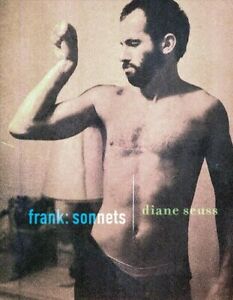 These poems tell the story of a life at risk of spilling over the edge of the page, from Seuss’s working-class childhood in rural Michigan to the dangerous allures of New York City and back again.
These poems tell the story of a life at risk of spilling over the edge of the page, from Seuss’s working-class childhood in rural Michigan to the dangerous allures of New York City and back again.
With sheer virtuosity, Seuss moves nimbly across thought and time, poetry and punk, AIDS and addiction, Christ and motherhood, showing us what we can do, what we can do without, and what we offer to one another when we have nothing left to spare.
Like a series of cels on a filmstrip, frank: sonnets captures the magnitude of a life lived honestly, a restless search for some kind of “beauty or relief.” Seuss is at the height of her powers, devastatingly astute, austere, and―in a word―frank.
“The sonnet, like poverty, teaches you what you can do / without,”
# New Poetry
frank: sonnets
by Diane Seuss
Publisher: Graywolf Press
March 2, 2021
Language: English
Paperback
152 pages
ISBN-10: 1644450453
ISBN-13: 978-1644450451
$15.99
• fleursdumal.nl magazine
More in: #Modern Poetry Archive, Archive S-T, Archive S-T

Time-Stone
Hallo, Metropolitan –
Ubiquitous windows staring all ways,
Red eye notching the darkness.
No use to ogle that slip of a moon.
This midnight the moon,
Playing virgin after all her encounters,
Will break another date with you.
You fuss an awful lot,
You flight of ledger books,
Overrun with multiple ant-black figures
Dancing on spindle legs
An interminable can-can.
But I’d rather… like the cats in the alley… count time
By the silver whistle of a moonbeam
Falling between my stoop-shouldered walls,
Than all your tally of the sunsets,
Metropolitan, ticking among stars.
Lola Ridge
(1873-1941)
Time-Stone
• fleursdumal.nl magazine
More in: Archive Q-R, Archive Q-R, Ridge, Lola
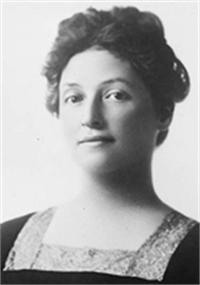
Canticle Of The Babe
I
Over the broken world, the dark gone by,
Horror of outcast darkness torn with wars;
And timeless agony
Of the white fire, heaped high by blinded Stars,
Unfaltering, unaghast;–
Out of the midmost Fire
At last,–at last,–
Cry! …
O darkness’ one desire,–
O darkness, have you heard?–
Black Chaos, blindly striving towards the Word?
–The Cry!
Behold thy conqueror, Death!
Behold, behold from whom
It flutters forth, that triumph of First-Breath,
Victorious one that can but breathe and cling,–
This pulsing flower,–this weaker than a wing,
Halcyon thing!–
Cradled above unfathomable doom.
II
Under my feet, O Death,
Under my trembling feet!
Back, through the gates of hell, now give me way.
I come.–I bring new Breath!
Over the trampled shards of mine own clay,
That smoulder still, and burn,
Lo, I return!
Hail, singing Light that floats
Pulsing with chorused motes:–
Hail to thee, Sun, that lookest on all lands!
And take thou from my weak undying hands,
A precious thing, unblemished, undefiled:–
Here, on my heart uplift,
Behold the Gift,–
Thy glory and my glory, and my child!
III
(And our eyes were opened; eyes that had been holden.
And I saw the world, and the fruits thereof.
And I saw their glories, scarlet-stained and golden,
All a crumbled dust beneath the feet of Love.
And I saw their dreams, all of nothing worth;
But a path for Love, for Him to walk above,
And I saw new heaven, and new earth.)
IV
The grass is full of murmurs;
The sky is full of wings;
The earth is full of breath.
With voices, choir on choir
With tongues of fire,
They sing how Life out-sings–
Out-numbers Death.
V
Who are these that fly;
As doves, and as doves to the windows?
Doves, like hovering dreams round Love that slumbereth;
Silvering clouds blown by,
Doves and doves to the windows,–
Warm through the radiant sky their wings beat breath.
They are the world’s new-born:
Doves, doves to the windows!
Lighting, as flakes of snow;
Lighting, as flakes of flame;
Some to the fair sown furrows;
Some to the huts and burrows
Choked of the mire and thorn,–
Deep in the city’s shame.
Wind-scattered wreaths they go,
Doves, and doves, to the windows;
Some for worshipping arms, to shelter and fold, and shrine;
Some to be torn and trodden,
Withered and waste, and sodden;
Pitiful, sacred leaves from Life’s dishonored vine.
VI
O Vine of Life, that in these reaching fingers,
Urges a sunward way!
Hold here and climb, and halt not, that there lingers
So far outstripped, my halting, wistful clay.
Make here thy foothold of my rapturous heart,–
Yea, though the tendrils start
To hold and twine!
I am the heart that nursed
Thy sunward thirst.–
A little while, a little while, O Vine,
My own and never mine,
Feed thy sweet roots with me
Abundantly.
O wonder-wildness of the pushing Bud
With hunger at the flood,
Climb on, and seek, and spurn.
Let my dull spirit learn
To follow with its longing, as it may,
While thou seek higher day.–
But thou, the reach of my own heart’s desire,
Be free as fire!
Still climb and cling; and so
Outstrip,–outgrow.
O Vine of Life, my own and not my own,
So far am I outgrown!
High as I may, I lift thee, Soul’s Desire.
–Lift thou me higher.
And thou, Wayfaring Woman, whom I meet
On all the highways,–every brimming street,
Lady Demeter, is it thou, grown gaunt
With work and want?
At last, and with what shamed and stricken eyes,
I see through thy disguise
Of drudge and Exile,–even the holy boon
That silvers yonder in the Harvest-moon;–
That dimly under glows
The furrows of thy worn immortal face,
With mother-grace.
O Queen and Burden-bearer, what of those
To whom thou gavest the lily and the rose
Of thy far youth?… For whom,
Out of the wondrous loom
Of thine enduring body, thou didst make
Garments of beauty, cunningly adorned,
But only for Death’s sake!
Largess of life, but to lie waste and scorned.–
Could not such cost of pain,
Nor daily utmost of thy toil prevail?–
But they must fade, and pale,
And wither from thy desolated throne?–
And still no Summer give thee back again
Thine own?
Lady of Sorrows,–Mother,–Drudge august.
Behold me in the dust.
Josephine Preston Peabody
(1874 – 1922)
Canticle Of The Babe
• fleursdumal.nl magazine
More in: # Classic Poetry Archive, Archive O-P, Archive O-P
Winner of the 2021 Wandering Aengus Book Award!
 Alina Ștefănescu’s DOR is a compendium of desire, displacement, longing, and belonging. While the word “dor” itself “serves as a bridge which creates its own territory from fusion,” here Stefanescu’s words do their own act of bridging the spaces between the body and language. In these poems, tongues, like nations, have borders; nouns and verbs come alive with ownership and agency. Stefanescu writes “a good girl poem waits // for the bass.” but these are not good girl poems.
Alina Ștefănescu’s DOR is a compendium of desire, displacement, longing, and belonging. While the word “dor” itself “serves as a bridge which creates its own territory from fusion,” here Stefanescu’s words do their own act of bridging the spaces between the body and language. In these poems, tongues, like nations, have borders; nouns and verbs come alive with ownership and agency. Stefanescu writes “a good girl poem waits // for the bass.” but these are not good girl poems.
Part genealogy of influences, part meditation on love, lust, and loss, and part pointed feminist critique, DOR is a multi-faceted collection that creates a newly textured landscape of language. — Emily Holland, author of Lineage and editor of Poet Lore
Alina Stefanescu was born in Romania and lives in Birmingham, Alabama with her partner and several intense mammals. Her writing can be found in diverse journals, including Prairie Schooner, North American Review, FLOCK, Southern Humanities Review, Crab Creek Review, Virga, Whale Road Review, and others. Alina is the author of Ribald, a prose microchapbook, from Bull City Press. She serves as Poetry Editor for Pidgeonholes, Poetry Editor for Random Sample Review, Poetry Reviewer for Up the Staircase Quarterly, and Co-Director of PEN America’s Birmingham Chapter. A finalist for the 2019 Kurt Brown AWP Prize, Alina won the 2019 River Heron Poetry Prize.
Poem for the Black Bird
(. . .)
You will never forget me, Doru. No one else left
their homeland for you. Her hands shook, pressing
words into the flesh of our home. The life she was
leaving. Her notes, that winding charred necklace,
encircling us. The bird was not black.
It was the color of fire absent smoke.
I can’t forget what it spoke.
Dor
by Alina Stefanescu
English
Poetry
Paperback
Pages: 112
ISBN-13: 9780578915784
Publisher: Wandering Aengus Press
Publication date: 07/22/2021
$20.00
• fleursdumal.nl magazine
More in: #More Poetry Archives, - Book News, Archive S-T, Archive S-T
Een nieuwe ster aan het poëtisch firmament
Leeft een lichaam nog als het alleen maar naar een beeldscherm staart? Wat glinstert er tussen de ruïnes van de eenentwintigste eeuw? Dat onderzoekt Maxime Garcia Diaz in deze spetterende debuutbundel.
 Haar associatieve gedichten kronkelen, bedwelmen, ontregelen, en wortelen diep in het digitale, het feminiene en het hedendaagse. Flarden van nieuwsberichten vermengen zich met academische theorie en uitgestorven webpagina’s uit de jaren nul. In haar poëzie worden grenzen poreus – tussen lichamen, talen, stemmen – en is alles onzuiver. Het is warm in de hivemind is als een analoog internet, een papieren web, een bloederige rotzooi van popcultuur, ondode URL’s en meisjeslichamen. Een bruisend poëtisch debuut waarin de taal welig tiert, over fantasie, gekte, woede, angst, en een spookachtige revolutie. Deze meerstemmige, meertalige maelstrom lijkt nog het meest op het internet zelf: grillig, gevaarlijk en vol van een duistere en vreugdevolle overvloed.
Haar associatieve gedichten kronkelen, bedwelmen, ontregelen, en wortelen diep in het digitale, het feminiene en het hedendaagse. Flarden van nieuwsberichten vermengen zich met academische theorie en uitgestorven webpagina’s uit de jaren nul. In haar poëzie worden grenzen poreus – tussen lichamen, talen, stemmen – en is alles onzuiver. Het is warm in de hivemind is als een analoog internet, een papieren web, een bloederige rotzooi van popcultuur, ondode URL’s en meisjeslichamen. Een bruisend poëtisch debuut waarin de taal welig tiert, over fantasie, gekte, woede, angst, en een spookachtige revolutie. Deze meerstemmige, meertalige maelstrom lijkt nog het meest op het internet zelf: grillig, gevaarlijk en vol van een duistere en vreugdevolle overvloed.
live through this w/ me
(. . .)
voor nu heb ik geen honger meer
ik heb de hele middag in een bushokje
gezeten (neorexisch koninkrijk)
met euroshopper & amnesia haze
en een amerikaanse tiener
opgekruld in een hoekje als een
suburban spook, zielige zieke ideeën
& een meisje (girl of the geist)
that promised to live through this
with me
(. . .)
Maxime Garcia Diaz (1993) studeerde Cultural Analysis aan de Universiteit van Amsterdam. In 2019 won ze het NK Poetry Slam. Haar werk is eerder gepubliceerd door De Internet Gids, Samplekanon, Yes The Void, Deus Ex Machina en De Optimist. In 2020 kwam haar chapbook Artificielle uit bij het label Marktcorruptie en werkte ze met andere jonge schrijvers aan de voorstelling Poetic Resistance. Garcia Diaz is Nederlands en Uruguayaans en woont in Amsterdam.
Het is warm in de hivemind
Maxime Garcia Diaz
Gedichten
ISBN: 9789403120614
NUR: 306
Type: Paperback
Aantal pagina’s: 112
Uitgever: De Bezige Bij
Verschijningsdatum: 15-07-2021
Prijs: 22,99 euro
• fleursdumal.nl magazine
More in: #Editors Choice Archiv, Archive C-D, Archive C-D, Garcia Diaz, Maxime, STREET POETRY
A highly anticipated collection of new poems from the award-winning writer Ocean Vuong: Time Is a Mother.
How else do we return to ourselves but to fold
The page so it points to the good part
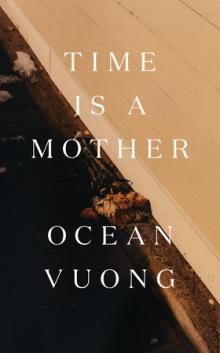 In this deeply intimate second poetry collection, Ocean Vuong searches for life among the aftershocks of his mother’s death, embodying the paradox of sitting within grief while being determined to survive beyond it. Shifting through memory, and in concert with the themes of his novel On Earth We’re Briefly Gorgeous, Vuong contends with personal loss, the meaning of family, and the cost of being the product of an American war in America. At once vivid, brave, and propulsive, Vuong’s poems circle fragmented lives to find both restoration as well as the epicenter of the break.
In this deeply intimate second poetry collection, Ocean Vuong searches for life among the aftershocks of his mother’s death, embodying the paradox of sitting within grief while being determined to survive beyond it. Shifting through memory, and in concert with the themes of his novel On Earth We’re Briefly Gorgeous, Vuong contends with personal loss, the meaning of family, and the cost of being the product of an American war in America. At once vivid, brave, and propulsive, Vuong’s poems circle fragmented lives to find both restoration as well as the epicenter of the break.
The author of the critically acclaimed poetry collection Night Sky With Exit Wounds, winner of the 2016 Whiting Award, the 2017 T. S. Eliot Prize, and a 2019 MacArthur fellow, Vuong writes directly to our humanity without losing sight of the current moment. These poems represent a more innovative and daring experimentation with language and form, illuminating how the themes we perennially live in and question are truly inexhaustible. Bold and prescient, and a testament to tenderness in the face of violence, Time Is a Mother is a return and a forging forth all at once.
Ocean Vuong is the author of the critically acclaimed poetry collection Night Sky with Exit Wounds and the New York Times bestselling novel On Earth We’re Briefly Gorgeous. A recipient of the 2019 MacArthur “Genius” Grant, he is also the winner of the Whiting Award and the T.S. Eliot Prize. His writings have been featured in The Atlantic, Harper’s Magazine, The Nation, The New Republic, The New Yorker, and The New York Times. Born in Saigon, Vietnam, he currently lives in Northampton, Massachusetts.
Time Is a Mother
By Ocean Vuong
Poetry
Hardcover
ISBN-13: 9780593300237
Publisher: Penguin Publishing Group
Publication date: 04/05/2022
Pages: 128
$24.00
This item will be available on April 5, 2022
Available for Pre-Order.
• fleursdumal.nl magazine
More in: #Editors Choice Archiv, - Book News, - Bookstores, Archive U-V, Archive U-V, Ocean Vuong

Writing
A man who keeps a diary, pays
Due toll to many tedious days;
But life becomes eventful then
His busy hand forgets the pen.
Most books, indeed, are records less
Of fullness than of emptiness.
William Allingham
(1824 – 1889)
Writing
• fleursdumal.nl magazine
More in: Allingham, William, Archive A-B, Archive A-B

Her Portrait Immortal
Must I believe this beauty wholly gone
That in her picture here so deathless seems,
And must I henceforth speak of her as one
Tells of some face of legend or of dreams,
Still here and there remembered–scarce believed,
Or held the fancy of a heart bereaved.
So beautiful she–was; ah! “was,” say I,
Yet doubt her dead–I did not see her die.
Only by others borne across the sea
Came the incredible wild blasphemy
They called her death–as though it could be true
Of such an immortality as you!
True of these eyes that from her picture gaze,
Serene, star-steadfast, as the heaven’s own eyes;
Of that deep bosom, white as hawthorn sprays,
Where my world-weary head forever lies;
True of these quiet hands, so marble-cool,
Still on her lap as lilies on a pool.
Must I believe her dead–that this sweet clay,
That even from her picture breathes perfume,
Was carried on a fiery wind away,
Or foully locked in the worm-whispering tomb;
This casket rifled, ribald fingers thrust
‘Mid all her dainty treasure–is _this_ dust!
Once such a dewy marvel of a girl,
Warm as the sun, and ivory as the moon;
All gone of her, all lost–except this curl
Saved from her head one summer afternoon,
Tied with a little ribbon from her breast–
This only mine, and Death’s now all the rest.
Must I believe it true! Bid me not go
Where on her grave the English violets blow;
Nay, leave me–if a dream, indeed, it be–
Still in my dream that she is somewhere she,
Silent, as was her wont. It is a lie–
She is not dead–I did not see her die.
Richard Le Gallienne
(1866 – 1947)
Her Portrait Immortal
From: The lonely Dancer and other Poems, 1913
• fleursdumal.nl magazine
More in: Archive G-H, Archive G-H, Gallienne, Richard Le

Kitchener
No stone is set to mark his nation’s loss,
No stately tomb enshrines his noble breast;
Not e’en the tribute of a wooden cross
Can mark this hero’s rest.
He needs them not, his name untarnished stands,
Remindful of the mighty deeds he worked,
Footprints of one, upon time’s changeful sands,
Who ne’er his duty shirked.
Who follows in his steps no danger shuns,
Nor stoops to conquer by a shameful deed,
An honest and unselfish race he runs,
From fear and malice freed.
George Orwell
(1903 – 1950)
Published in the Henley
and South Oxfordshire Standard 21st July 1916
• fleursdumal.nl magazine
More in: Archive O-P, Archive O-P, George Orwell, Orwell, George
In this follow-up to her acclaimed debut The Met Office Advises Caution, Rebecca Watts observes and tests the limits of humanity’s engagement with the non-human.
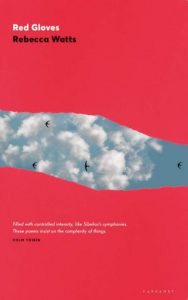 By turns lyrical and narrative, the poems examine familiar subjects – environmental crisis, hawks, hospitals, the sea, barbecues, flowers, Emily Dickinson – only to find their subjects staring, sometimes fighting, back.
By turns lyrical and narrative, the poems examine familiar subjects – environmental crisis, hawks, hospitals, the sea, barbecues, flowers, Emily Dickinson – only to find their subjects staring, sometimes fighting, back.
Nature and nurture, equally red in tooth and claw, power a book-long sparring match between the overthinking poet and the ever-thoughtless universe, between the craft’s isolation and the world’s irrepressible variety.
Gloves on and gloves off, the poet’s hands destroy and build, gather and scatter, caress and strike.
Red Gloves
The women are carrying the coffin. Under the fear
of slippage they make slow steps.
We cannot say that they advance.
More than one woman is weathering – from the cool
top of her head to her strained fingers to her toes
pushed together in interview shoes – the urge,
like a rip tide, to run backwards and away.
Today is not a normal day.
( . . . )
Rebecca Watts was born in Suffolk in 1983 and currently lives in Cambridge. Her debut poetry collection, The Met Office Advises Caution, was published by Carcanet in 2016. She is also the editor of Elizabeth Jennings: New Selected Poems (Carcanet, 2019).
Publisher: Carcanet Press Ltd.
Language: English
Paperback
72 pages
ISBN-10 : 178410955X
ISBN-13 : 978-1784109554
2020
£9.89
• fleursdumal.nl magazine
More in: #Editors Choice Archiv, - Book News, Archive W-X, Archive W-X
Thank you for reading Fleurs du Mal - magazine for art & literature